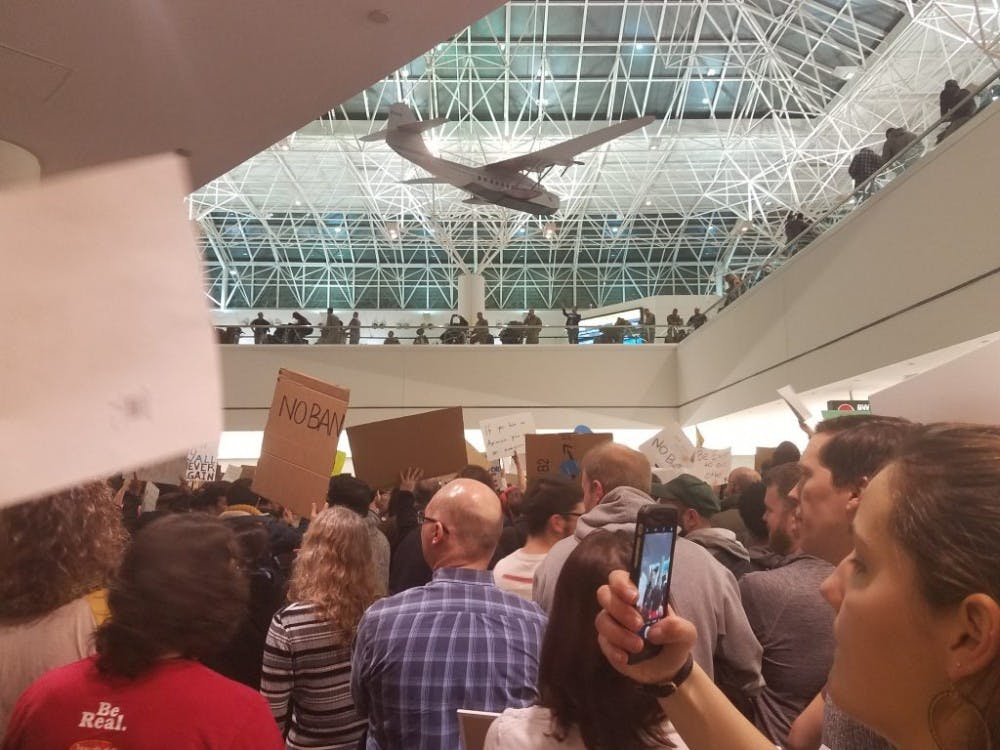President Donald Trump’s executive order banning citizens from seven predominantly Muslim countries had a direct and sweeping effect on the Hopkins community.
The order, which was signed on Friday, Jan. 27 immediately confused passengers, as well as federal agencies and airlines as they attempted to enforce and comply with the travel ban.
International students and faculty affected by the order can no longer visit family or travel to academic conferences, fearing they will not be allowed to return.
Over the weekend, Hopkins students joined protests at the Baltimore-Washington International Thurgood Marshall (BWI) Airport, and an Iranian graduate student and his wife were detained at Washington Dulles International Airport for four hours.
On Saturday, University President Ronald J. Daniels released a statement saying that the University was closely monitoring the situation and endorsed a statement calling for an end to the ban. Early Wednesday morning, Daniels sent an emotional letter condemning Trump’s executive order.
The University Responds
Daniels’ letter described the order’s effect on the Hopkins community, citing the difficult decisions faculty, students and prospective patients now face.
“[T]he order stands in unambiguous opposition to our country’s long-cherished values and ideals. Openness, freedom of ideas, opportunity for the many, not the few. Values that lie, too, at the core of this country’s great universities,” Daniels wrote. “The human impact of such an assault on these core values was immediate, including at Johns Hopkins.”
In his letter, Daniels related the personal story of how his father, a Polish Jew, fled to Canada and escaped the Holocaust. Daniels emphasized the importance of offering refuge and opportunity to millions of people fleeing persecution and bloodshed.
He wrote that Hopkins will “strongly support the members of our community who need our direct assistance in the days and months ahead.”
On Wednesday night, the Office of International Services (OIS) held an information session about how the order will impact students. In a packed Mason Hall auditorium, students were able to speak with OIS representatives and a lawyer about their respective situations.
Personally affected
Omid Mehrgan is an Iranian graduate student currently living in the U.S. on a student visa. Mehrgan described the order as hastily composed, and worries of what it may mean for those affected.
“I feel targeted because, as I said before, the arbitrary nature of the order can set the stage and the tone for unpredictable future forms of assault,” he wrote in an email to The News-Letter. “I think it serves other purposes disguised as safety measures.”
Mehrgan, however, is hopeful as demonstrations and protests are held across the country to demand the ban’s removal.
“[I]n light of the demonstrations all over the US in the past days, I find it so reassuring to observe that the executive order in fact triggered more solidarity than the divisiveness in whose spirit it was composed,” he wrote.
Junior Darius Mostaghimi is half Iranian. Both of his parents were naturalized as U.S. citizens and he was born here. But, Mostaghimi still has family in Iran, and he is worried about when he will be able to see them again.
“The executive order represents an idea that says being an American and being of Persian heritage are irreconcilable. However, I never saw it that way and a lot of people don’t see it that way,” he said. “We see America classically as a melting pot in which people of different cultures come together through the gift of America’s open borders.”
Mostaghimi said that after Trump was elected, he felt unwanted in the U.S. For him, the executive order was a sobering moment, as he realized that Trump planned to carry out much of what he had promised on the campaign trail.
“For me, the pit was after he did the executive order,” he said. “That’s when I felt angry, a little hopeless. But after that wore off, I felt resistant.”
“Respect existence or expect resistance”
Over 2,000 protesters, including dozens of Hopkins students, occupied the International Arrivals terminal of BWI Airport for hours on Sunday, Jan. 29.
There were no reports of detentions at BWI, but lawyers at the demonstration were on hand to provide free legal help to future arrivals and the protesters. Each time an international flight arrived, the crowd cheered, and several passengers cheered with them.
A man in a Trump hat shook his head and smirked as protesters heckled him. Local politicians, including former Maryland Governor Martin O’Malley and Representative Elijah Cummings, supported the protestors in the terminal.
The demonstrators shouted “No hate, no fear. Refugees are welcome here!” and adapted Ludacris’ song “Move B*tch,” chanting “Move Trump! Get out the way, get out the way, get out the way.”
For junior Zaya Amgaabaatar, the United States’ history of immigration is part of what makes it great. She attended the protest to both denounce Trump and support those that he “harmed, disenfranchised, endangered and targeted.”
“My parents and I immigrated here from Mongolia, and so it’s hard for me to imagine the U.S. as something other than a haven for immigrants,” she wrote in an email to The News-Letter.
Senior Andy Ingersoll condemned Trump for ignoring the plight of millions of refugees fleeing the Syrian Civil War.
“I went to the protest at BWI because Trump’s ban is immoral, illegal and dangerous,” he wrote in an email to The News-Letter. “The people that Trump’s EO keeps out are not terrorists, but many are fleeing terror – some are refugees, who have waited months or sometimes years to be cleared by our (already extensive) vetting process, while others are military translators, who risked their lives fighting for American interests in Iraq.”
Ingersoll wanted to remind Trump that because he lost the popular vote, his actions don’t have the approval of the majority of Americans.
“I also hope that the recent protests demonstrate to Trump that the public will not be politically apathetic and will continue to oppose his racist ‘America First’ rhetoric,” he wrote.





